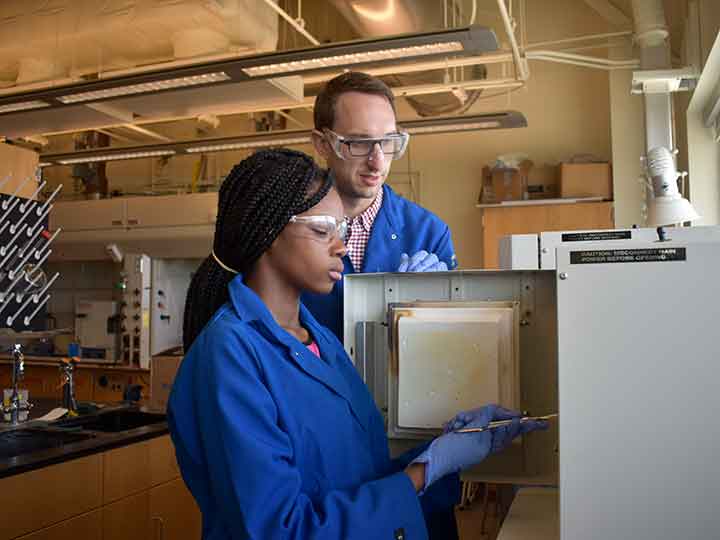A Talk with Chemistry Professor Jakoah Brgoch, Ph.D.

Researchers continue to conduct their studies with innovative approaches while in quarantine.
UH chemistry professor Jakoah Brgoch, Ph.D., is one of the HPE Data Science Institute compute resources users productively working on research regarding sustainability and computational sciences.
Brgoch contributes to various publications pertaining to disparate areas of chemistry. Besides his professorship, he is actively involved in other roles outside of the classroom.
Brgoch emphasizes what he is currently working on with his lab group, personal motivations and his goals.
What is the main focus of your research?
JB: Developing inorganic materials for a range of applications including luminescent materials for use in energy efficient light bulbs and modern displays like LED TVs to superhard materials that are used in nearly all modern tools for cutting, drilling, grinding and polishing.
These machines are also essential for energy-critical applications ranging from engine valves to high-speed bearings and advanced military uses. We aim to tackle each problem with a combination of synthetic chemistry, computational modeling, and data science to understand our materials as thoroughly as possible.
What is the goal for you and your research group?
JB: Our goal is to find new alternative materials for everyday applications that require less energy to produce, contain more earth-abundant elements or reduce overall energy consumption.
Also, we start each project thinking about how we can use computational and data science to make our experimental research more effective and how it can influence what kind of tools we can create that will benefit the scientific community. Even if we can address one of these challenges, I will be happy.
In your opinion, what is the most exciting capability of the supercomputers in the HPE Data Science Institute?
JB: The HPE Data Science Institute provides several outstanding capabilities, most notably is the service and support that the staff provides to the students. They are seemingly always available day or night to help my student solve problems and keep our research moving forward.
It also offers numerous classes and webinars that many of my group members and I have attended. Expanding our network to a different community helps us learn better ways of doing our science while showing the exciting results that the HPE Data Science Institute has helped make happen.
In response to COVID-19, how were you able to successfully transition your teachings & research activity remotely?
JB: The fact that my research has a large computational and data science component helped my students quickly transition from the lab to working online. This change has been supported tremendously by the HPE Data Science Institute. We needed to use significantly more computational power and time.
The staff and administration have been wonderfully flexible in helping us get the resources we need. Teaching has been a bigger challenge, but with time and practice the virtual classroom has been easier to navigate. The students have also been understanding and recognize that most of the time the faculty are trying to figure everything out and be successful in this new environment just like they are.
What advice would you give to other researchers who are transitioning their work to be remote during the current crisis?
JB: In chemistry and materials science there has been a strong push toward computational or machine learning research projects since the researchers are working remotely. I think that it is fantastic to see scientists who may normally be more comfortable working in the research lab willing to make this transition in an effort to keep their research projects moving forward during these uncertain times.
I encourage them and their students to reach out for help though. Computational science involves a steep learning curve and many students are trying to make this transition independently. It’s a whole new research field that has many obstacles and pitfalls. We are more than willing to help avoid these mistakes, many of which we have already made ourselves, and make sure that their results are robust and exciting.
What motivates you in your personal life or career?
JB: My goal is to train students to think creatively and independently. It is fun to watch students fight their way through research problems and come up with truly unique solutions that I may not have considered.
There is a lot of back and forth and extensive discussion that goes on in my group every day (even now this happens by virtual meetings) and I enjoy seeing how far we can push our science and what new discoveries are just waiting for us to stumble across them.
You are a principal investigator at the Texas Center for Superconductivity at the University of Houston (TcSUH). What is your favorite part of your position? How does your work affect Houstonians and the community?
JB: It is great to be a part of TcSUH because it brings researchers from different departments together and provides the opportunity for us to collaborate and solve large challenges. Universities are usually portioned into departments and it can be difficult to get to know faculty in other parts of the school.
TcSUH provides a way to overcome these barriers and learn more about the cross-cutting work that is going on in various research groups. It allows multidisciplinary groups, like mine, to find new collaborators and find faculty with common interest in case I ever need help solving research problems.